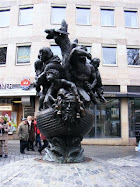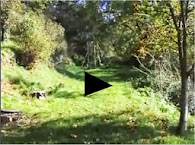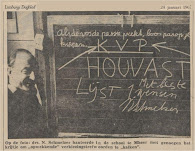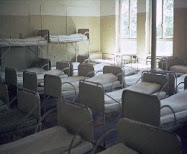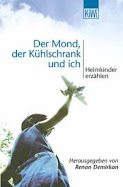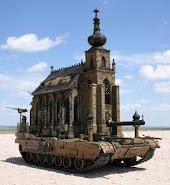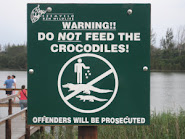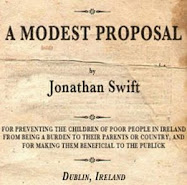dinsdag, februari 28, 2017
zondag, februari 26, 2017
vrijdag, februari 24, 2017
donderdag, februari 23, 2017
More Child sex abuse royal commission: I went to Catholic school, but I was one of the lucky ones
Antony Funnell
Many people continue to ask how such industrial-scale sexual abuse could possibly have happened. But to me, that's the wrong question entirely.
The real question is this: how could it have been any different, given the institutionalised violence mandated by the Catholic education system?
woensdag, februari 22, 2017
Huizinga lezen
Zuster Immaculata die al vier en dertig jaar
verlamde oude mensen wast, in bed verschoont,
en eten voert,
zal nooit haar naam vermeld zien.
Maar elke ongewassen aap die met een bord: dat hij
vóór dit, of tegen dat is, het verkeer verspert,
ziet 's avonds reeds zijn smoel op de tee vee.
verlamde oude mensen wast, in bed verschoont,
en eten voert,
zal nooit haar naam vermeld zien.
Maar elke ongewassen aap die met een bord: dat hij
vóór dit, of tegen dat is, het verkeer verspert,
ziet 's avonds reeds zijn smoel op de tee vee.
dinsdag, februari 21, 2017
maandag, februari 20, 2017
Submissions on records and recordkeeping published
The Royal Commission into Institutional Responses to Child Sexual Abuse has published more than 40 submissions on Records and Recordkeeping Practices in relation to child sexual abuse in institutions.
The submissions received came from a wide range of government and non-government organisations including state governments, not-for-profit organisations, advocacy groups, professional bodies, research groups, religious organisations, academics and individuals.
They are based on a consultation paper released in September last year titled Records and recordkeeping practices.
Royal Commission CEO Philip Reed said the submissions contribute significantly to the Royal Commission’s knowledge and understanding on institutional recordkeeping practices and how these practices could be improved for children in the future.
“The Royal Commission has heard from countless survivors about their painful experiences with poor records and recordkeeping practices in institutions. Many have told us that they had difficulty accessing records, including those who were unable to find records about themselves,” Mr Reed said.
“The consultation paper revealed that good recordkeeping practices contribute to survivors’ sense of identity, knowledge of past experience and memories and information about their families, culture and community. Good records and recordkeeping practices also assist in better handling of child sexual abuse complaints, redress and criminal proceedings,” Mr Reed said.
The consultation paper proposed five high-level principles to help institutions implement comprehensive record management system, promote child safety and institutional accountability.
The five key principles are listed below:
1. Creating and keeping accurate records is in the best interest of children.
2. Accurate records must be created about all decisions and incidents affecting child protection.
3. Records relevant to child sexual abuse must be appropriately maintained.
4. Records relevant to child sexual abuse must only be disposed of subject to law or policy.
 5. Individuals’ rights to access and amend records about them can only be restricted in accordance with law.
5. Individuals’ rights to access and amend records about them can only be restricted in accordance with law.
“The submissions discussed, among other things, the current recordkeeping procedures of different institutions, issues and problems identified with poor recordkeeping practices and how the five principles could improve institutional records creation, maintenance and archiving procedures,” Mr Reed said.
Read the submissionszaterdag, februari 18, 2017
Abonneren op:
Posts (Atom)

















































